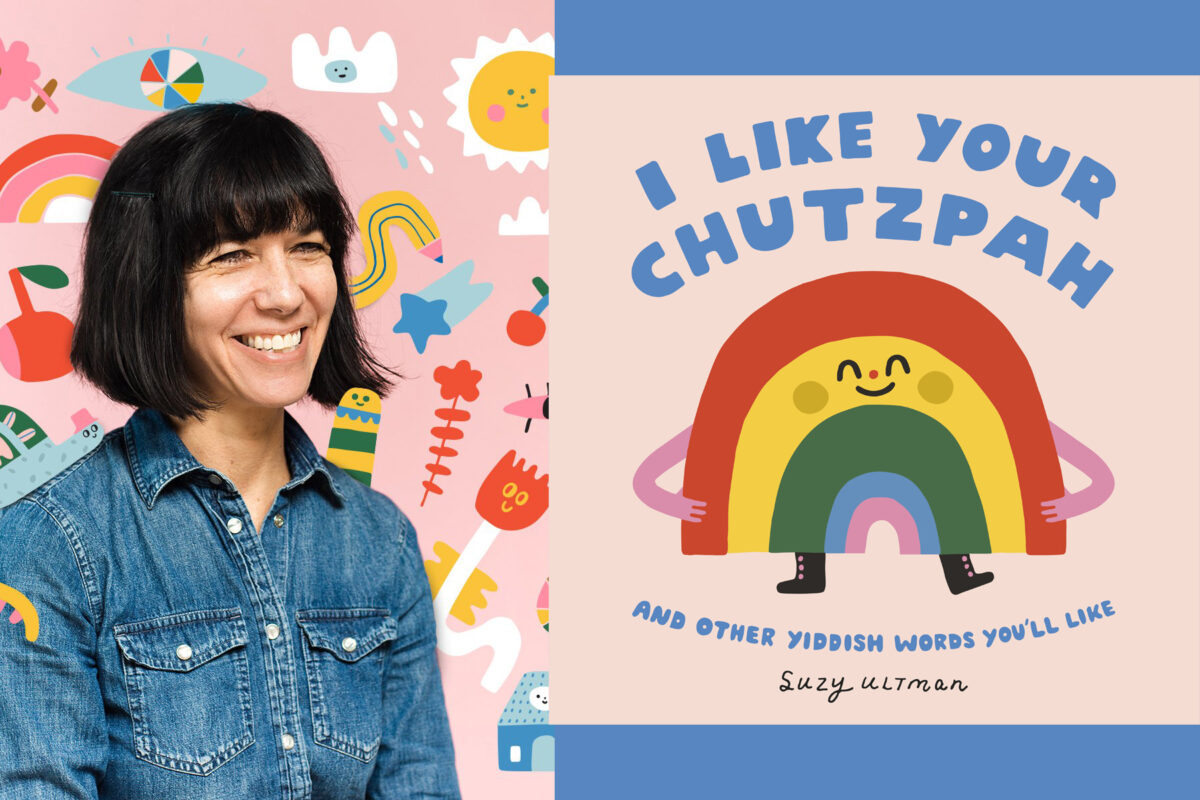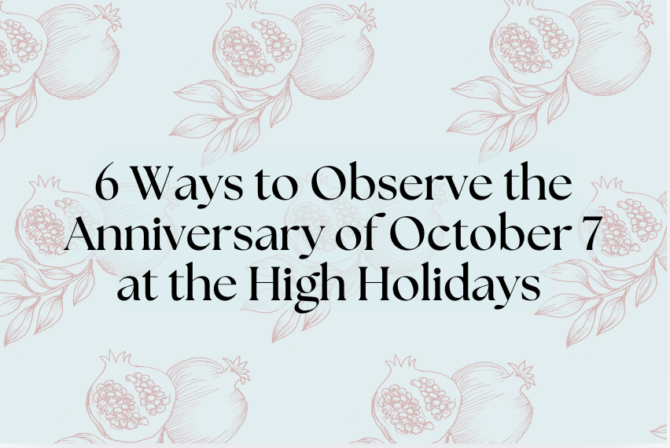Suzy Ultman’s “I Like Your Chutzpah” is deceptively simple. A heart-melting cartoon of a smiling rainbow with a red button nose stands proudly on the cover of the new board book meant for toddlers. But inside is not only a lexicon of first Yiddish words, but a trove of Jewish joy and parenting wisdom.
“I Like Your Chutzpah” and the other books in Ultman’s upcoming series of Jewish kids’ books connect many facets of the Jewish illustrator’s life: A hard-won lesson in therapy where she learned to embrace her young son’s anger. Bright memories of her grandmother affectionately praising her chutzpah as a child. Fond memories of her childhood rabbi, who made sure to make Jewish practice as connected and welcoming to children as it could be. The role she embraced of being the first Jewish kid many of her peers met while growing up in the small town of State College, Pennsylvania, which she’s carried on as an adult living in Ohio. A love for Jewish languages she found when her dad, a professor at Penn State, took their family to Israel for a sabbatical year.
On every page of Ultman’s book is a joyful, endearing illustration in her signature cartoony style: little squiggly creatures, smiling hearts, crowds of people. And in each one of them is a Yiddish word or expression that pertains to the drawing. “I like your chutzpah” reads the page with that darling rainbow. “I like your schmutz” reads another page with a cat messily eating a melting (and smiling!) ice cream cone. “I like your schpiel” reads another with a little girl going on and on and on. “I even like it when you kvetch” reads another page with a rainy crowd. The Yiddish definitions in English are more chatty and colloquial than you would find in a dictionary, helping to anchor the language as one of fondness and feeling.
But what I really like about “I Like Your Chutzpah” is that it offers parents and caretakers a chance to repeat a kind of mantra that helps build, at least in my opinion, more emotionally sturdy kids. It’s the idea of loving our kids no matter what they do, no matter how big or messy or angry or moody they are at any given moment. These phrases, beyond enriching people’s lives with more Jewish words from the ancient Jewish tongue, serve us little comments that we can repeat to our children in those inevitably tough parenting moments. “I like schmutz,” we can tell them before we plop them in the bath after a messy experiment. “I like your meshugas,” we can say when they’re being wild and ridiculous — before asking them to tone it down and focus on the task at hand. It allows those little moments to become part of the everyday joy of Jewish parenting.
Finding the precise definitions for Yiddish words proved to be a challenge for Ultman and her Jewish editor. The meaning of a word like “chutzpah,” for example, can change from negative to positive, depending on the speaker and intention. The book has many words that American Jews will find familiar and comforting, and some that might be more surprising. Ultman was very mindful about what words to choose, going with ones that felt more kid-like, that she remembered hearing as a child and “loving the sound of.”
“Over time, they’ve really become almost onomatopoeia. There’s nothing else quite like them — like shpilkes is one of my favorite. I don’t think there’s any other way to say that,” Ultman tells Kveller.
I’ve spoken to Ultman twice — once at a crowded cafe in Manhattan, the other time for almost an hour during the week we got the news about the six Israeli hostages murdered — and her love and connection for the Jewish experience is always palpable. She first started leaning into her Jewish identity as an illustrator around 2021, when, following the killing of George Floyd and the protests that erupted after, many of us where having conversations about authenticity and representation. She asked herself, “What I could do in my neck of the woods [to try] to only take up shelf space that was mine?” She wanted to “tell a story that’s as close to me as possible.” In conversations with her husband, editor and therapist, she realized that she felt like being Jewish was this little compartment in her life that she kept separate from everything else, a secret little drawer full of memories and rituals and moments. Suddenly, she wanted to tell Jewish stories that looked at herself as a whole person, not just one expression of “different pieces of myself.”
In her Jewish art and books, Ultman wants to show Jewish kids and families the magic of the everyday Jewish experience. In a world where Jewish stories are often relegated to the Holocaust or Hanukkah miracles, Ultman hopes to show us as a “whole people that live,” to pay homage to “these whimsical modern, contemporary sides to ourselves.” For non-Jewish readers, Ultman is more of a connector than a didactic teacher; she invites them to see Judaism as beautiful and immersive, about more than wars and antisemitism, and her upcoming Jewish books will touch on more of the diverse Jewish experiences across denominations and continents.
Over the years, Ultman slowly built her Jewish niche with the sweetest illustrations, including a series of cards for Egg Press with a Jewish flare, from a sweet little bagel that lets you know you’re someone’s everything, to a shalom card with a charming flower and a sheepish bearlike creature holding a dreidel for Hanukkah. On her website, she sells cartoon prints with an owl saying shalom and little Jewish pennants for the bedroom of a “little mensch.” In a world of blue and yellow Jewish designs that feel like an afterthought, Ultman creates a technicolor and sweet taxonomy of Jewish illustrations and products that feel sorely needed, fresh and colorful, impossible not to like, even love.
Get “I Like Your Chutzpah” on Bookshop, Amazon or wherever else you find your books.








